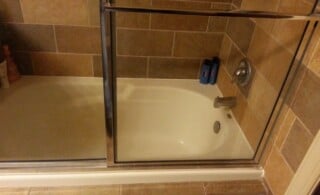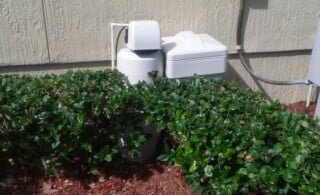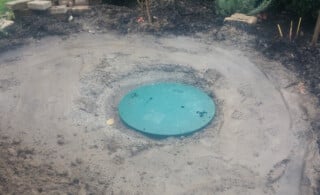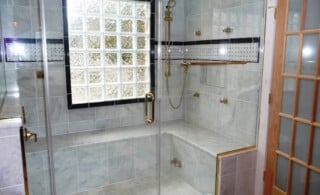
Photo: Catherine Falls Commercial / Getty Images
If you’ve hopped into a cold shower, can’t get hot water from your washing machine, or can only get cold water from your tap, something is likely wrong with your water heater. So why is your hot water not working? That depends on the condition and type of water heater you have, plus external factors, such as the weather and your power supply.
In this guide, we’ll help you determine why your hot water isn’t working and whether you have a gas or water heater. We’ll also give you tips to determine if the solution is a manageable DIY project or if it’s time to call the plumber or electrician.
In this article:
- Gas or Electric Off
- Thermostat Issues
- Cold Weather
- Small Tank
- Old Age
- Water Leak
- Extinguished Pilot Light
- Thermocouple Issues
- Gas Leak
- Basic Electrical Issues
- Tripped Breaker
- Broken Heating Element
- When to Call a Professional
- FAQs
1. Gas or Electric Off (All Water Heaters)
If your hot water faucet isn’t working, it could be as simple as your power supply being shut off. While it’s easy to tell if your electricity has been shut off—just flip the bathroom light switch to see if the lights come on—you’ll need to check a gas stove or gas heating system to see if your gas has been shut off.
Your water heater may rely on either power source to heat the water. If that power source has been shut off, you’ll need to call your utility company to report the outage and get an estimate of when the power will come back. If it truly is an outage affecting your home or entire neighborhood, there’s nothing you can do but wait.
2. Thermostat Issues (All Water Heaters)
If your electricity or gas supply hasn’t been shut off, it’s time to investigate the water heater itself. One of the biggest causes of the hot water in your house not working is the thermostat on the water heater unit itself.
You should set a properly functioning water heater thermostat between 122 and 140 degrees Fahrenheit. A lower temperature setting could not only result in cold showers but also be dangerous: Water heaters at lower temperatures can lead to the growth of Legionella bacteria, which can cause Legionnaires’ disease. If your thermostat is below the 122-degree threshold, bump it up. Your water should run hot again within one to two hours, depending on the fuel source and tank size.
If your thermostat is faulty, you’ll need to replace it. While more experienced DIY-ers could replace the thermostat on their water heater, most homeowners should consider calling a local water heater repair service to tackle the project.
Find a Water Heater Repair Pro Near You3. Cold Weather (All Water Heaters)
Even the most efficient, high-powered water heaters struggle to maintain heat when outdoor temperatures drop dramatically. If you’re battling a winter storm with frigid temperatures in the negatives, your water heater may not be able to provide water as hot as you’re used to.
The unit may give out completely if temperatures drop further at night when the water heater is less likely to be used. If possible, bump the temperature up on your water heater a little higher during winter storms and polar vortexes. Just remember to turn it back down once it starts to warm up outside.
4. Small Tank (All Water Heaters)

Photo: Kinek00 / iStock / Getty Images Plus / Getty Images
Your water heater tank size could also lead to cold water because you’ve used up all the hot water available. For example, households with two people using hot water may find that their small tank does the job. But the tank size may need to be increased once their family grows or they have guests staying for the holidays.
If that’s the case, it might be time to upgrade to a larger tank. Water heater tanks generally range from 20 to 80 gallons; if your home has more than two people, aim for the high end of that range. You can hire a licensed plumber to install a new water heater for you.
Alternatively, you can consider a tankless water heater, which heats water as you go. Tankless water heaters cost between $1,250 and $3,600 to install.
5. Old Age (All Water Heaters)
The average water heater lasts about 10 years, though higher-quality water heaters (and tankless heaters) can stretch for as long as 20 years. If your water heater is nearing the end of its life span, it’s likely to be less efficient—meaning you may have cold or lukewarm water more regularly.
Rather than try to repair it, it probably makes sense to replace it completely. Installing a water heater costs between $850 and $1,680, depending on your chosen model and if you hire a professional. Unless you’re experienced with water heater installation, it’s a good idea to hire a professional water heater installation company near you.
If you want to extend the life expectancy of your water heater, keep up with regular maintenance. Periodically flushing your water heater can remove sediment that might otherwise build up and calcify, making it less efficient—or even damaging it beyond repair. The cost to flush a water heater runs between $75 and $250.
6. Water Leak (All Water Heaters)
Another potential issue leading to no hot water in your home is a leaking water tank. If your tank leaks, you’re paying for the water heater to heat up nothing because the water never fills the tank. If you’re not getting hot water from your faucet or showerhead, check out the base of your water heater. If the ground around it is wet, the tank is probably leaking.
While a professional may be able to repair your water heater, you’ll likely need to replace it—and it could be more cost-effective in the long run. The cost to repair a water heater ranges between $230 and $950.
Find a Water Heater Repair Pro Near You7. Extinguished Pilot Light (Gas Water Heaters)
The previous issues could happen to anywater heater, regardless of the power source. However, gas and electric water heaters operate differently, meaning they can also malfunction differently.
A common reason to have hot water not working while cold isworking is an extinguished pilot light on your gas water heater. This small flame should always be burning; when the unit determines that it needs to heat more water, it’ll release gas over the flame, which will then ignite and heat up the contents of the tank. If it goes out, the gas won’t ignite.
So why might your pilot light go out? There could be a number of causes. Something as simple as high winds or a drafty window could blow the pilot light out, but there could also be more serious issues, like low gas pressure, loose valves, or even a faulty thermocouple (more on that below). If you discover your pilot light is out, follow the manufacturer’s instructions on your water heater to reignite it.
CAUTION: If you smell gas, don’t attempt to relight it. Instead, vacate your home (including family members and pets) and call the gas company to report a leak.
8. Thermocouple Issues (Gas Water Heaters)

Photo: iconphotomedia / iStock / Getty Images Plus / Getty Images
If the pilot light stays on after you’ve reignited it, you’re in the clear—it likely went out due to a downdraft or some other coincidental cause. But if the pilot light doesn’t stay lit after you’ve reignited it, there could be an issue with the unit’s thermocouple. The thermocouple is an important component of a water heater: If it detects that the pilot light is out, it’ll prevent any gas flow. To detect this, the thermocouple literally probes the pilot light flame.
It’s common for thermocouples to get knocked out of alignment, meaning they might not be positioned in the pilot light flame. In this case, it may be a matter of repositioning the thermocouple. Older thermocouples may also require cleaning if they have any buildup; just use sandpaper or steel wool to clean.
If you’ve repositioned and cleaned the thermocouple but the pilot light still won’t stay ignited, the entire thermocouple could be faulty. Though the part is affordable, you may want to hire a local gas plumber to handle the replacement if you’re inexperienced. The job should be fast and inexpensive.
9. Gas Leak (Gas Water Heaters)
A more serious issue for gas water heaters is a gas leak. While you can examine the color of the flame of the pilot light to determine if your heater might be releasing carbon monoxide (yellow flame), it’s better to trust a professional. This isn’t a decision to leave to untrained eyes.
You might not even need to examine the color of the flame. If you smell gas in your home, especially near the water heater, leave your home immediately and call the gas company.
10. Basic Electrical Issues (Electric Water Heaters)
Electric water heaters can also have their woes. If your hot water isn’t working and you have an electric heater, try turning the unit off for a few minutes and then back on. If the water heats up in the next one to two hours, you’re probably in the clear.
If the unit is still not working, it could be something as easy as an unplugged or faulty cord. Turn the unit off before further inspecting the water heater—the risk of electrocution is possible. In general, it’s a good idea to hire an electrician to inspect the unit.
Find a Water Heater Repair Pro Near You11. Tripped Breaker (Electric Water Heaters)
It’s also possible your unit tripped a breaker. Check your circuit breaker to see if the water heater breaker has flipped to off. Even if it’s on, try flipping it off (hold for 15 to 30 seconds), then flip it back on.
If you’re regularly having trouble with breakers, it may be time to replace the entire panel. Replacing an electrical panel costs between $530 and $2,000.
12. Broken Heating Element (Electric Water Heaters)

Photo: Hispanolistic / Getty Images Plus / Getty Images
Beyond unplugged cords and tripped breakers, electric units may also suffer from faulty heating elements. Diagnosing a broken heating element isn’t something for DIY-ers. Instead, you’ll want to hire a local water heater repair service for the diagnosis and replacement.
When to Call a Professional
If your hot water isn’t working, you might be able to take care of the issue yourself. If it’s a matter of flipping a breaker, adjusting the thermostat, or reigniting the pilot light, you can probably handle the job on your own.
But some hot water problems require the work of a local plumber or electrician near you. Call a professional if you encounter the following:
- Your water heater tank is leaking.
- You need to replace the thermocouple (gas water heater), heating element (electric water heater), or thermostat.
- You need to replace your water heater entirely.
Vacate the premises and call your utility company immediately if you detect a gas leak.
FAQs
Why is my hot water not working but my cold water is?
There are several reasons your cold water may work even when your hot water doesn’t. Your water heater’s power supply may have been shut off, or there may be issues with the water heater, like an extinguished pilot light, tripped breaker, or a leak.
Water heaters may also be less efficient in cold weather, and ones with smaller tanks can run out of hot water if you’re running too many appliances at once or your family is taking too many back-to-back showers.
What type of water heater is the most reliable?
Electric water heaters are more efficient than gas water heaters, but gas water heaters are more cost-effective to run. Both types of water heaters can malfunction for various reasons. Tankless water heaters are more reliable than typical storage tank water heaters and can last twice as long, but they’re twice as expensive.
How long does it take for hot water to reset?
How long it takes for hot water to reset in your water heater depends on the type of heater you have. A gas water heater may heat up within one hour, while an electric water heater could take up to2 hours. It may take longer for your water heater to heat up if:
- It has a larger tank.
- It’s really cold outside.
- You’ve programmed it at a higher temperature setting.
Tankless water heaters heat water as you use them, so you don’t need to wait for the water to heat up.
Find a Water Heater Repair Pro Near You Tub and Stall Shower Installation
Tub and Stall Shower Installation  Water Softening Systems Filter Out the Hassles
Water Softening Systems Filter Out the Hassles  4 Types of Septic Tanks
4 Types of Septic Tanks  Clogged Drain Fixes
Clogged Drain Fixes  Common Shower Door Problems
Common Shower Door Problems 

Are You Familiar With This Topic? Share Your Experience.